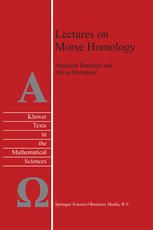

Most ebook files are in PDF format, so you can easily read them using various software such as Foxit Reader or directly on the Google Chrome browser.
Some ebook files are released by publishers in other formats such as .awz, .mobi, .epub, .fb2, etc. You may need to install specific software to read these formats on mobile/PC, such as Calibre.
Please read the tutorial at this link: https://ebookbell.com/faq
We offer FREE conversion to the popular formats you request; however, this may take some time. Therefore, right after payment, please email us, and we will try to provide the service as quickly as possible.
For some exceptional file formats or broken links (if any), please refrain from opening any disputes. Instead, email us first, and we will try to assist within a maximum of 6 hours.
EbookBell Team

4.1
50 reviewsThis book is based on the lecture notes from a course we taught at Penn State University during the fall of 2002. The main goal of the course was to give a complete and detailed proof of the Morse Homology Theorem (Theo rem 7.4) at a level appropriate for second year graduate students. The course was designed for students who had a basic understanding of singular homol ogy, CW-complexes, applications of the existence and uniqueness theorem for O.D.E.s to vector fields on smooth Riemannian manifolds, and Sard's Theo rem. We would like to thank the following students for their participation in the course and their help proofreading early versions of this manuscript: James Barton, Shantanu Dave, Svetlana Krat, Viet-Trung Luu, and Chris Saunders. We would especially like to thank Chris Saunders for his dedication and en thusiasm concerning this project and the many helpful suggestions he made throughout the development of this text. We would also like to thank Bob Wells for sharing with us his extensive knowledge of CW-complexes, Morse theory, and singular homology. Chapters 3 and 6, in particular, benefited significantly from the many insightful conver sations we had with Bob Wells concerning a Morse function and its associated CW-complex.